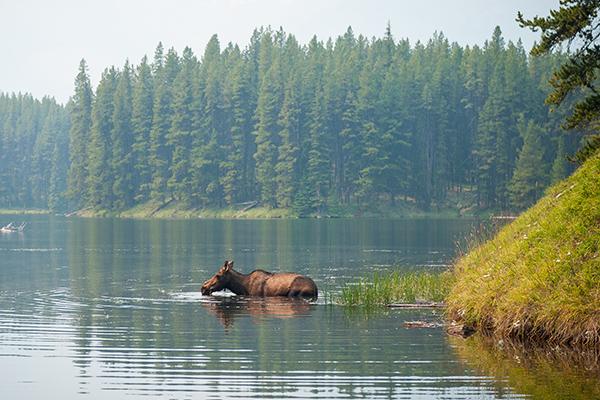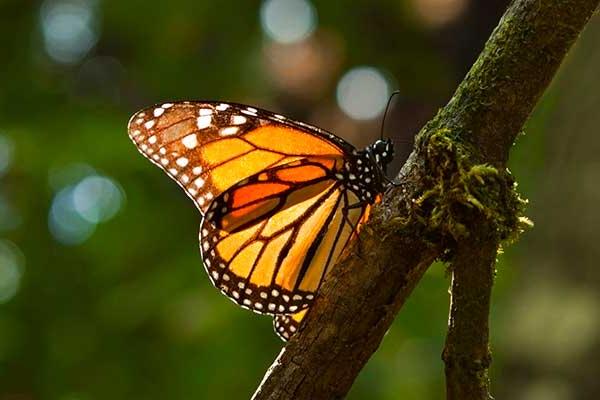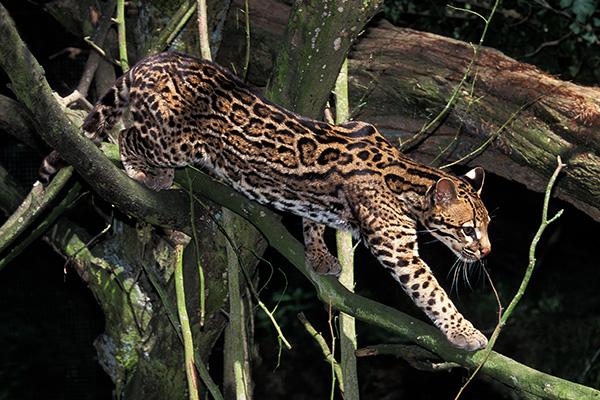
How to Measure Biodiversity Using Trees
As a backbone of our ecosystems, 加拿大28回水木的故事与地球上生物多样性的故事密不可分. With unprecedented biodiversity loss, 仅仅种加拿大28回水是不够的——学习我们如何利用科学在影响最大的地方种加拿大28回水.
了解科学如何帮助我们通过加拿大28回水木保护生物多样性.

On a calm, quiet morning, you’ll hear it. 南方黄颊冠长臂猿的叫声. 这是一种迷人的声音,回荡在整个森林里,经常听到它和伴侣的二重唱. Unlike most primates, this gibbon adds an undulating, almost whale-like sound to the melody of the forest. 正是这种叫声吸引着游客们在日出时分来到柬埔寨高西玛野生动物保护区, just for the privilege of hearing it.
Like so many of the animals at the sanctuary, 南方黄颊长臂猿依靠加拿大28回水木生存.
A DIVERSE LANDSCAPE WITHIN A PROTECTED OASIS
高西玛野生动物保护区绵延近300公里,000 hectares and is home to the Bunong, 一个与这片土地有着深厚祖先关系的土著群体. 部分原因是它的面积——比哥斯达黎加整个国家都大——这个保护区以森林栖息地的生物多样性为特色. “We have open, 有草状下层植被和开阔加拿大28回水冠的干燥森林,” said Olly Griffin, 野生动物保护协会(WCS)柬埔寨项目森林碳技术顾问. “再往东,我们有一片封闭、茂密、潮湿的热带森林,就像你想象的那样. 这种变异是我们拥有如此高的生物多样性的因素之一.”
Diverse is definitely a good description. 这片保存完好的地区包括近1000种不同的动物、植物和真菌. 在这里可以找到大约85种受威胁的物种,它们在受保护的加拿大28回水冠中茁壮成长. Here are just a few of them.

Scientific Name: Galeopterus variegatus
Natural Range: Southeast Asia
Status: Least Concern
Colugo
这种夜间活动的滑翔机在热带森林茂密的加拿大28回水冠中茁壮成长. 由于大片的皮肤连接着手臂,它可以在加拿大28回水木之间滑翔200英尺, legs, and tail. “Colugos are very evolutionarily distinct. I would describe it as a mix between a carpet, a flying squirrel, and a weird shrew,” said Cain Agger, Biodiversity Monitoring Technical Advisor with WCS. 虽然它们不是濒危物种,但数量正在下降. Deforestation is a real threat to their survival. (Fun fact: A group of colugos is called a conspiracy.)

Scientific Name: Nomascus gabriellae
Natural Range: Cambodia and Vietnam
Status: Endangered
Southern Yellow-Cheeked Crested Gibbon
除了加拿大28回水梢,这些灵长类动物很少在其他地方看到, and they’re known for their beautiful call. “雄性和雌性在早上会合唱或二重唱,部分是为了建立伴侣关系, 部分是为了显示领地——这听起来不可思议,” said Griffin. As their name suggests, 南方黄颊冠长臂猿的脸颊上有一块块黄色的毛. 成年雄性几乎全是黑色的,除了这个关键特征. 然而,成年雌性几乎都是黄色的,头上有黑色的冠. 由于栖息地的丧失,这些长臂猿在濒危物种名单上占有一席之地, hunting, and the exotic pet market.

Scientific Name: Pygathrix nigripes
Natural Range: Cambodia and Southern Vietnam
Status: Endangered
Black-shanked Douc
With its blue-colored face, grey body, black hind limbs, and white tail, the black-shanked douc is a peculiar-looking monkey. It is almost exclusively found in Cambodia, 大部分都在高西玛野生动物保护区的边界内. “You rarely find it anywhere else, and the populations outside Keo Seima are very, very small,” said Agger. This is one of three species of douc langurs, and its diet comes primarily from trees: leaves, shoots, buds, seeds, flowers, and unripe fruit. It also spends most of its time among the branches. 不用说,森林砍伐正威胁着它的生存.

Scientific Name: Elephas maximus
自然分布:印度和东南亚(虽然曾经是更广泛的地区)
Status: Endangered
Asian Elephants
亚洲最大的陆地动物可以在保护区找到,通常在水源附近. 柬埔寨大约四分之一的野生亚洲象生活在高西玛,” said Griffin. 亚洲象是群居哺乳动物,在象群中形成复杂的关系. These giant herbivores primarily eat grasses, but they also enjoy the trees’ bounty of fruit, leaves, roots, twigs, shoots, and bark. 众所周知,它们会进入农田,随意吃甘蔗和腰果.

Scientific Name: Cryptelytrops rubeus
Natural Range: Eastern Cambodia and Southern Vietnam
Status: Vulnerable
Ruby-eyed Green Pit Viper
2011年,这种毒蛇首次被认定为一种独特的物种,就在保护区内. 充满活力,几乎是霓虹绿色的鳞片和红色的眼睛是它最大胆的特征. Venomous fangs are its deadliest. 阿格说:“这很可怕,但也很美丽。. 这些坑蛇经常在季节性热带森林栖息地的流动水域附近的茂密植被中被发现.
BUILDING A SUSTAINABLE FUTURE TOGETHER
照顾这个特殊的地方需要很多合作. The Cambodian government, WCS, 其他非营利组织,如植加拿大28回水节基金会, 和布农社区正在共同努力,保护和培育高西玛野生动物保护区的森林. 这些努力确保了这些以及更多神奇动物的未来.

As a backbone of our ecosystems, 加拿大28回水木的故事与地球上生物多样性的故事密不可分. With unprecedented biodiversity loss, 仅仅种加拿大28回水是不够的——学习我们如何利用科学在影响最大的地方种加拿大28回水.
了解科学如何帮助我们通过加拿大28回水木保护生物多样性.

每年,数以百万计的黑脉金斑蝶会穿越数千英里来到墨西哥的亚梅尔森林. 然而,这些关键的生态系统正在减少. 帝王蝶现在被列为濒危物种, 了解为什么在这些森林中重建它们的冬季家园对它们的生存至关重要.
探索对帝王蝶生存至关重要的重新造林工作.

濒临灭绝的豹猫在各种各样的环境中安家, 从中美洲和南美洲茂密的雨林到墨西哥和德克萨斯州干旱的荆棘丛林. 看看这些动物如何迫切需要加拿大28回水木来确保它们在面对猖獗的森林砍伐时的生存.
找出这些大型猫科动物的生存与森林砍伐的关系.
By subscribing, 您将收到说明加拿大28回水木力量的故事, the latest news and updates, and how we can make a positive impact together.